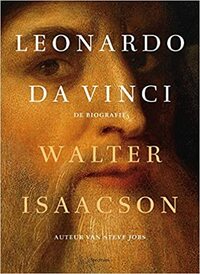You need to sign in or sign up before continuing.
Take a photo of a barcode or cover
You're telling me da Vinci moved away from the cradle of the Renaissance and one of the most beautiful cities in Europe to go be a STEMlord in Milan
An interesting book and an edition of spectacular quality (all pages are from glossy paper). The biography focuses more in the work of Leonardo than on his time. Is a careful analysis of each an every one of his paintings going in great detail of the technics and materials use in them and every individual element on them from the eyes, hands and gestures to the rocks and plants on the background reviewing at length the different analysis made using modern technology to determine what parts were painted by Leonardo at different times and what parts are the work of his collaborators, and what changes where made in the different layers of the painting it also describes all the different interest that Leonardo pursue and recorded in his many notebooks.
If you are a history buff like myself, you may by disappointed by the lack of historical context and depth of description of the cities and contemporaries of Leonardo.
If you are a history buff like myself, you may by disappointed by the lack of historical context and depth of description of the cities and contemporaries of Leonardo.
An absolutely fantastic study of da Vinci's life, writings, and creations - finished and unfinished. I'm sure this will be one of the leading da Vinci references for 21st-century popular history readers now and in the future.
I also recommend the audiobook narration by Alfred Molina (though I recommend it read at 1.25x speed, as it was a little slow otherwise).
I also recommend the audiobook narration by Alfred Molina (though I recommend it read at 1.25x speed, as it was a little slow otherwise).
It just feels incredibly dull and borderline fawning. I think Da Vinci is a fascinating figure, but this book does not feel objective or true.
Just some quick thoughts on some of the many reasons I've liked everything I've read by Isaacson....
I love his full length conclusions at the end of his works and his added analyses throughout. In his conclusions, he integrates everything he just wrote into great summations, and you can compare your take-aways with his. I've read many biographies and history books that just end...they leave me wanting some opinions about legacies or final thoughts from the subject matter expert. I like re-visiting his books and reading the conclusions as a way to remember the great things within it. Regarding analyses throughout: in the life of Leonardo da Vinci, there are many mysteries and differing opinions on seemingly everything surrounding his work, and hearing Isaacson's opinions and reasons for them after clearly hearing both sides of the story is refreshing.
If you are looking for reasons why this specific Isaacson book is worth reading, entertaining, and definitely 5 stars, I think David McCullough's blurb on the back cover sums it up best:
"To read this magnificent biography of Leonardo da Vinci is to take a tour through the life and works of one of the most extraordinary human beings of all time in the company of the most engaging, informed, and insightful guide imaginable. Walter Isaacson is at once a true scholar and a spellbinding writer. And what a wealth of lessons there are to be learned in these pages."
I love his full length conclusions at the end of his works and his added analyses throughout. In his conclusions, he integrates everything he just wrote into great summations, and you can compare your take-aways with his. I've read many biographies and history books that just end...they leave me wanting some opinions about legacies or final thoughts from the subject matter expert. I like re-visiting his books and reading the conclusions as a way to remember the great things within it. Regarding analyses throughout: in the life of Leonardo da Vinci, there are many mysteries and differing opinions on seemingly everything surrounding his work, and hearing Isaacson's opinions and reasons for them after clearly hearing both sides of the story is refreshing.
If you are looking for reasons why this specific Isaacson book is worth reading, entertaining, and definitely 5 stars, I think David McCullough's blurb on the back cover sums it up best:
"To read this magnificent biography of Leonardo da Vinci is to take a tour through the life and works of one of the most extraordinary human beings of all time in the company of the most engaging, informed, and insightful guide imaginable. Walter Isaacson is at once a true scholar and a spellbinding writer. And what a wealth of lessons there are to be learned in these pages."
informative
slow-paced
3.5 stars
This is a good book on Leonardo da Vinci, even an excellent one. Walter Isaacson is one of my favorite authors of biography. The problem is that if you write the biography of an artist—or in Leonardo's case, a true Renaissance Man—the facts of his/her life are generally fairly boring [Van Gogh being an exception]. Apart from Leonardo's art and notebooks this book is basically, "Leonardo moved to ____ where his patron was _____. He worked on art/science. Then he moved to ____ where his patron was ____, he worked on art/science... Then he died.
So the vast majority of this book is discussing Leonardo's art/notebooks/science investigations, which is fine if you are interested in art/drawing. If not, then you will not find this book riveting [like Isaacson's biographies of Einstein and Jobs are riveting].
Isaacson has a tendency to perhaps over describe, or rather embellish unnecessarily his descriptions of Leonardo's art, which is typical of most art critics/historians, it seems to me. Here is one example:
"Stand before the Mona Lisa, and the historical discussions about how it was commissioned fade into oblivion. As Leonardo worked on it for most of the last sixteen years of his life, it became more than a portrait of an individual. It became universal, a distillation of his accumulated wisdom about the outward manifestations of our inner lives and about connections between ourselves and our world."
Really, Walter? Really? This reads more like hagiography. I've seen the Mona Lisa in the Louvre and no, I did not think it was "a distillation of his accumulated wisdom about the outward manifestations of our inner lives," but then I'm just a member of the bourgeoisie.
Leonardo was an amazing genius across perhaps more disciplines than any man in history, including a theory of the heart that was only proven 500 years later. This alone makes the book worth reading, but I find most biographies of artists like this, a little boring, a lot of hagiography, and a lot of over describing and over imagining of their works of art.
This is a good book on Leonardo da Vinci, even an excellent one. Walter Isaacson is one of my favorite authors of biography. The problem is that if you write the biography of an artist—or in Leonardo's case, a true Renaissance Man—the facts of his/her life are generally fairly boring [Van Gogh being an exception]. Apart from Leonardo's art and notebooks this book is basically, "Leonardo moved to ____ where his patron was _____. He worked on art/science. Then he moved to ____ where his patron was ____, he worked on art/science... Then he died.
So the vast majority of this book is discussing Leonardo's art/notebooks/science investigations, which is fine if you are interested in art/drawing. If not, then you will not find this book riveting [like Isaacson's biographies of Einstein and Jobs are riveting].
Isaacson has a tendency to perhaps over describe, or rather embellish unnecessarily his descriptions of Leonardo's art, which is typical of most art critics/historians, it seems to me. Here is one example:
"Stand before the Mona Lisa, and the historical discussions about how it was commissioned fade into oblivion. As Leonardo worked on it for most of the last sixteen years of his life, it became more than a portrait of an individual. It became universal, a distillation of his accumulated wisdom about the outward manifestations of our inner lives and about connections between ourselves and our world."
Really, Walter? Really? This reads more like hagiography. I've seen the Mona Lisa in the Louvre and no, I did not think it was "a distillation of his accumulated wisdom about the outward manifestations of our inner lives," but then I'm just a member of the bourgeoisie.
Leonardo was an amazing genius across perhaps more disciplines than any man in history, including a theory of the heart that was only proven 500 years later. This alone makes the book worth reading, but I find most biographies of artists like this, a little boring, a lot of hagiography, and a lot of over describing and over imagining of their works of art.
informative
medium-paced

